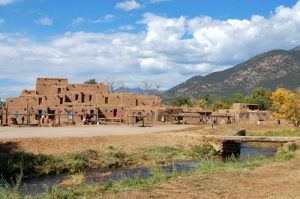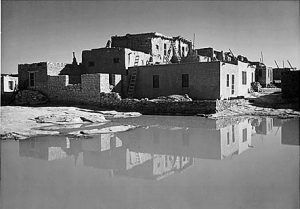Visiting the pueblos of the southwest or Indian reservations anywhere in the U.S. is a great way to experience the cultures and traditions of Native Americans. However, visitors should keep several rules of etiquette in mind when touring these “cities” that are called home to our fellow Americans. Some of these guidelines may be culturally foreign for non-Indian visitors, but are extremely important to the tribal members and will help you to avoid misunderstandings or violations of native customs.
While each pueblo and reservation operates under its own government, establishing its own rules for visitors, these are guidelines that apply to all pueblos and reservations.
- Although most Pueblos, and some reservations, are open to the public during daylight hours, the homes are private. Do not enter without an invitation.
- Please stay in the immediate village area. Do not wander into restricted areas or areas outside the village but still on reservation property. Do not hike or camp on Native American lands without permission.
- Please control your children and see that they are respectful. If they cannot be controlled, please excuse yourself and visit on another day.
- Pets are not allowed at most Indian Pueblos or reservations.
- Alcohol, weapons, and illegal drugs are not allowed and will not be tolerated.
- Kivas, cemeteries, and other sacred places are not to be entered by non-members of the community.
- Do not climb walls or other structures. Some are several hundred years old and damage easily.
- Do not pick up or remove any artifacts or objects, such as pieces of broken pottery.
- Please obey all traffic, parking, and speed limit signs. These communities are called home to children at play and many who are elderly.
- Do not enter a building unless you are sure it’s a public building. It’s extremely rude to enter someone’s house without an invitation.
- If you receive an invitation for a meal, accept graciously but do not linger. Thank your host, but a payment or tip is not appropriate.
- Treat the residents with courtesy (as you would like to be treated), respect their ways, and observe the posted restrictions that have been put in place to preserve the beauty and uniqueness of their land and people.
- Do not litter.
- Don’t offer to buy something unless you’re sure it’s for sale. Hint: If someone’s wearing it, it’s generally NOT for sale. Try the store instead.
Dances and Ceremonies
- Native American Dances are spiritual in nature and are not staged performances for your entertainment. Please act as though you were in your own place of worship. Please observe them with respect and quiet attention and don’t ask for an explanation of the ceremony. Applause after dances is not appropriate.
- Refrain from talking to the dancers. Do not approach them as they are entering, leaving, or resting near the kiva.
- Do not interrupt non-dance participants’ concentration by asking questions, talking, or waving to friends.
Photography
- Permits, fees, and restrictions vary among Pueblos and reservations. Before you snap, ask the Visitor’s Center about any specific rules. Some places, such as the Taos Pueblo, charge an additional fee.
- A photo permit does not give you a license to disrupt dances by getting in front of dancers or spectators.
- Never photograph an individual or private property without asking for permission. When permission is granted, it is customary to tip the individual.
- The same rules apply to audio recordings and sketches.
- Photographs are for private use only and generally may not be reproduced or resold without written permission.
Finally, call before visiting to make certain it’s open. Some ceremonial days are closed to outsiders.
Compiled and edited by Kathy Weiser-Alexander/Legends of America, updated August 2021.
Also See:
Ancient Cities of Native Americans
Pueblo Indians – Oldest Communities in the United States


